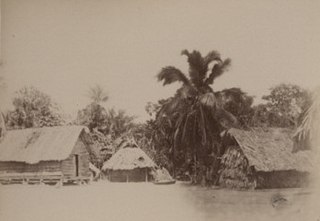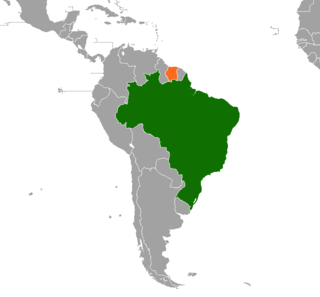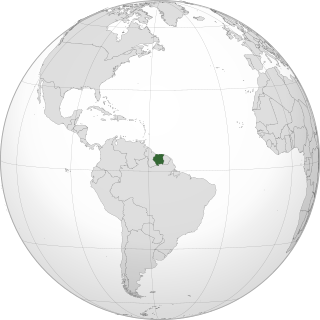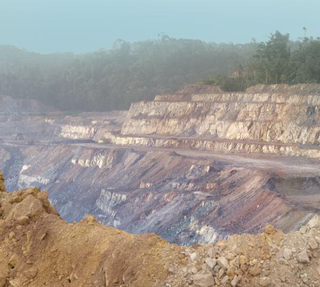
Sipaliwini is the largest district of Suriname, located in the south. Sipaliwini is the only district that does not have a regional capital, as it is directly administered by the national government in Paramaribo. Sipaliwini District includes disputed areas, with the southwestern region controlled and administered by Guyana, whereas the southeastern region is controlled by French Guiana.

Nieuw Jacobkondre is a town in the Sipaliwini District of Suriname. It is situated on the Saramacca River. The village is inhabited by Matawai people.
Heidoti is a village in Boven Saramacca municipality (resort) in Sipaliwini District in Suriname. Heidoti is home to Maroons of the Kwinti tribe.
Prostitution in Suriname is illegal but widespread and the laws are rarely enforced. Human trafficking and Child prostitution are problems in the country. Prostitutes are known locally as "motyo". UNAIDS estimate there to be 2,228 prostitutes in the country.

Boven Saramacca is a resort in Suriname, located in the Sipaliwini District. Its population at the 2012 census was 1,427. The dominant geographical feature of this resort is the Saramacca River. The resort is mainly inhabited by Maroons of the Matawai tribe.

The Rosebel gold mine is jointly owned by Iamgold (95%) and the government of Suriname (5%).

Brazil–Suriname relations are the bilateral relations between the Federative Republic of Brazil and the Republic of Suriname. Diplomatic relations were established on 3 March 1976. Brazil has an embassy in Paramaribo since the independence of Suriname on 25 November 1975. Suriname has an embassy in Brasília since 1976, and a consulate in Belém since 2012.

Brownsberg Nature Park is a nature park located in Suriname. The site measures 12,000 ha and is located in the district of Brokopondo around 130 km south from the capital city Paramaribo. The 500-meter high Brownsberg is the central point of the park. The site is located near the Brokopondo Reservoir. The park is managed by STINASU. Often the people of Suriname use the word Brownsberg as simple variant of Brownsberg Nature Park. Local people also write it as Bruijnsberg, pronounced as Braynsberg.

The Matawai are a tribe of Surinamese Maroons. The Matawai were originally part of the Saramaka, and signed a peace agreement with the Dutch colonists in 1762. The tribe split from the Saramaka, and in 1769, they were recognized as a separate tribe.
The COVID-19 pandemic in Suriname was caused by Severe acute respiratory syndrome coronavirus 2. The virus was confirmed to have reached Suriname on 13 March 2020. The case was a person who travelled from the Netherlands the previous week. On 3 April 2020, one person died. On 3 May 2020, all nine cases had recovered. On 18 May, an eleventh case was identified.

Antonio do Brinco, also Albina 2, is a garimpeiros village in the Tapanahony resort of the Sipaliwini District of Suriname. The village is located on the Lawa River, and is next to Peruano, and opposite Maripasoula in French Guiana. The village is named after Antonio with the earring who constructed the first commercial building.

Diana Marilva Pokie is a Surinamese politician. She was the assembly member from Brokopondo for the Brotherhood and Unity in Politics (BEP) before she was expelled. She returned to the assembly as the Brokopondo member representing the General Liberation and Development Party (ABOP) party. She became the first female vice-chairman of that party in 2019. On 16 July 2020, Pokie became Minister of Land and Forest Management. On 3 August 2021, Pokie was replaced by Dinotha Vorswijk.

Manlobi is a village of Ndyuka Maroons in the Sipaliwini District of Suriname. The village is located on an island in the Tapanahony River.
Snesiekondre is a village of Paramacca Maroons in the Sipaliwini District of Suriname. The village is located at the end of the road connecting Langatabiki to Patamacca and the rest of Suriname.

Squatting in Suriname is the occupation of unused land or derelict buildings without the permission of the owner. Maroons and indigenous peoples such as Tiriyó Amerindians have squatted buildings and illegal gold prospectors have occupied land.

Asongo Alalaparu, also Ashongo Alalaparoe, was a Granman of the indigenous Tiriyó people in Suriname.

Diplomatic relations between France and Suriname were established on 25 August 1976. Suriname and the French overseas department of French Guiana share a common border of 520 kilometres (320 mi). Suriname operates an embassy in Paris, a consulate in Cayenne, and an honorary consulate in Saint-Laurent-du-Maroni. France operates an embassy in Paramaribo, a consulate in Georgetown, Guyana, and an honorary consulate in Albina.
Nieuw-Lombe is a village in the resort of Klaaskreek in the Brokopondo District of Suriname. The village is located on the Suriname River, and is inhabited by Saramaka maroons. Nieuw-Lombe is a transmigration village built for the inhabitants of Lombé which was flooded by the Brokopondo Reservoir after the construction of the Afobaka Dam.
Nieuw-Koffiekamp is a village in the resort of Brownsweg in the Brokopondo District of Suriname. It is a transmigration village built for the inhabitants of Koffiekamp which was flooded by the Brokopondo Reservoir after the construction of the Afobaka Dam.

The mineral industry of Suriname makes up a large proportion of the country's economy. In 1916, the Aluminium Company of America began mining bauxite in the then Dutch colony of Surinam which over time became Suriname's main export.













